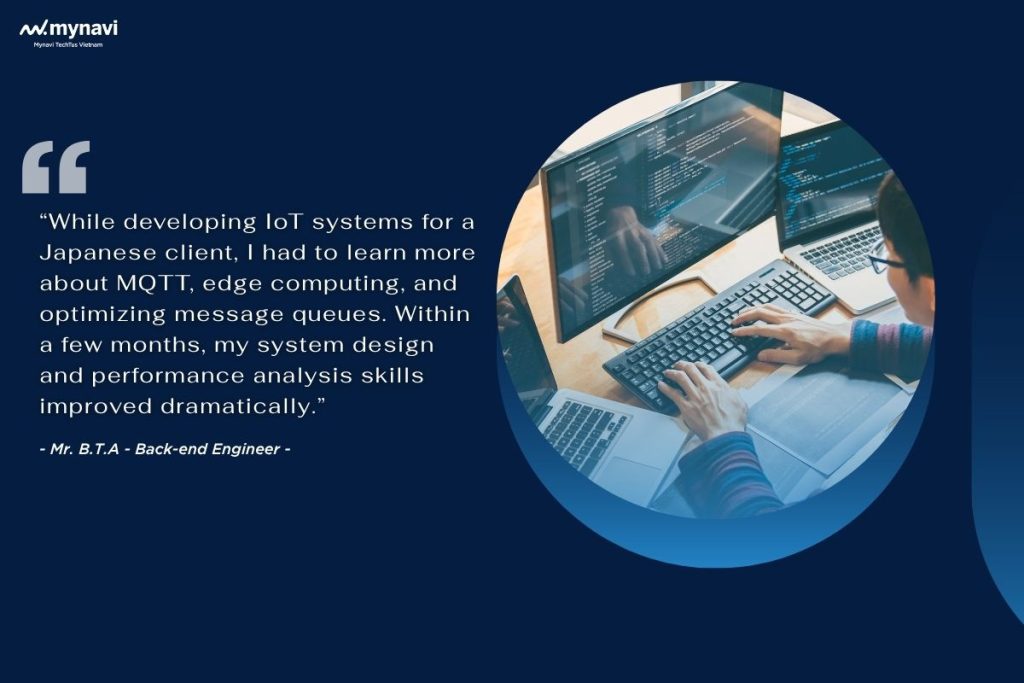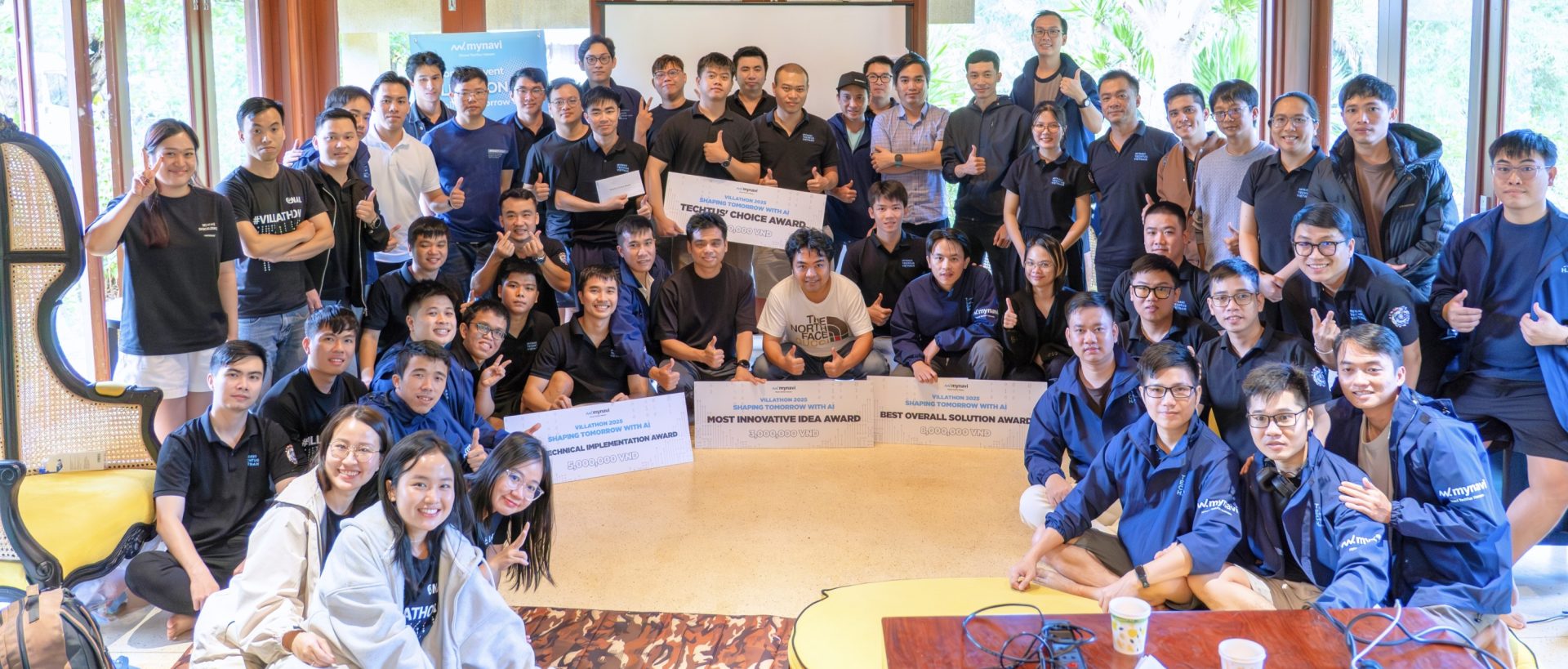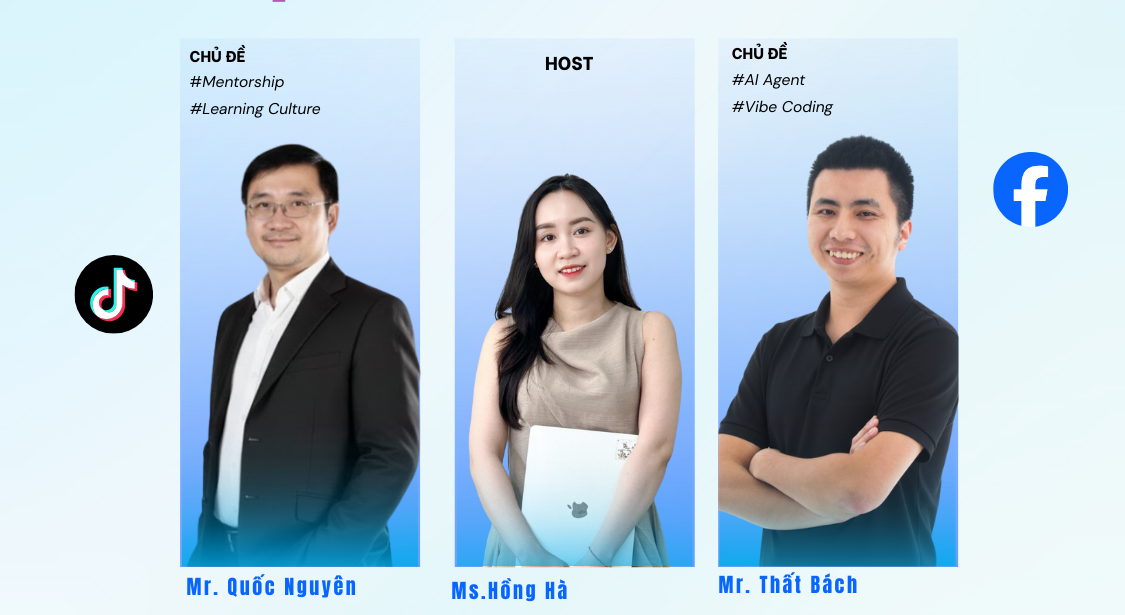With over a decade of experience in this domain, Mynavi TechTus Vietnam takes pride in its team of seasoned engineers who deeply understand Japanese culture and professional norms. The following insights are compiled from the perspectives of several Technical Leaders and Senior Engineers at TechTus, aiming to provide a more comprehensive view for engineers who are exploring this market.
The First Lessons When Working with Japanese Clients
According to Mr. H.N.D, a Technical Leader at TechTus, Japanese clients “tend to clarify everything before getting started. They value precision, transparency, systematic processes, and risk anticipation. Work only begins once all conditions are clearly agreed upon.”
From such experiences, many TechTus engineers have realized that collaborating with Japanese partners doesn’t just sharpen technical expertise – it also cultivates three essential skill groups:
1. Analytical and Problem-Solving Skills
Engineers must constantly ask “why”- digging into the root cause behind every requirement and questioning underlying assumptions. This process builds logical thinking, systematic reasoning, and the ability to clearly articulate ideas – key skills for developing large-scale systems.
2. Risk Management and Planning Skills
In the Japanese work environment, every possible scenario must be anticipated. Engineers learn to assess risks, prepare contingency plans, and report progress regularly. This strengthens their project management capability and proactive mindset.
3. Communication and Transparency
Reporting progress, sharing challenges, and raising issues early are considered mandatory. This “no-blame transparency” culture trains engineers to communicate effectively, listen actively, and collaborate more efficiently.
4. Attention to Detail and Thoroughness
Working with Japanese clients demands near-perfect precision in every line of code, design document, and specification. Engineers must pay attention to even the smallest inconsistencies – from variable naming conventions to end-user experience. This continuous cycle of review and refinement fosters meticulousness, patience, and the mindset of “getting it right the first time” – a trait highly valued in global tech environments.
These aren’t just requirements for working with Japanese clients, they form the foundation that makes engineers more reliable, disciplined, and ready for higher-level positions.
How the Japanese Market Accelerates Skill Development
According to Mr. B.A.T, a Software Engineer at TechTus, over three years of working with Japanese clients have “pushed him to constantly elevate his skills.”
“Japanese projects, especially in IoT and smart manufacturing, often involve big data processing, device connectivity, and 24/7 stability. While developing IoT systems for a Japanese client, I had to learn more about MQTT, edge computing, and optimizing message queues. Within a few months, my system design and performance analysis skills improved dramatically.”

Beyond technical growth, the Japanese working style also strengthens engineers’ critical thinking and logical reasoning. Clients frequently ask “Why did you choose this approach?” or “What if conditions change?” – forcing engineers to think deeply, foresee risks, and defend their solutions with clear, evidence-based logic. These are key skills for any senior or leadership role.
Self-Improvement through the Spirit of Kaizen
“I think Japanese clients are meticulous, not necessarily demanding. Sometimes engineers find them difficult simply because they can’t yet meet that level of meticulousness,”shared a BrSE (Bridge System Engineer) at TechTus.
“The Japanese mindset encourages continuous improvement. Every project includes a retrospective phase to reflect and optimize. That mindset keeps me from ever feeling ‘good enough’. I’m always seeking ways to make things faster, cleaner, and more efficient.”
Thanks to this meticulous and detail-oriented culture, TechTus teams have significantly improved both discipline and optimization skills. “In one project, through persistent collaboration with the client, our team reduced costs by 70% and doubled search speed. It was a powerful lesson in continuous improvement,” Mr. B.A.T recalled.
The Challenges
However, succeeding in the Japanese market is far from easy. Language barriers, indirect communication styles, and rigid management processes can make it challenging for young Vietnamese engineers to adapt. Japanese projects often require detailed documentation, strict schedules, and rigorous testing, where even a small mistake can undermine trust, the most valued aspect in Japanese business culture.
To address this, Mynavi TechTus Vietnam established a team of Associate Product Owners (APO) who serve as the communication bridge between Japanese clients and Vietnamese engineers.
Unlike IT Comtors (interpreters) in many outsourcing firms, APO at TechTus are not just language facilitators, they possess both business and technical expertise. This allows engineers to focus fully on technical solutions without getting lost in translation or cultural nuances.
This model shortens communication time, minimizes requirement misunderstandings, and accelerates project feedback loops. As a result, engineers can enhance both their technical and cultural competencies in a natural and effective way.
Conclusion
In essence, the Japanese market sets high standards, but simultaneously serves as a rapid-development environment for Vietnamese engineers. The meticulousness, transparency, and spirit of Kaizen from Japanese partners compel engineers to elevate both their technical proficiency and professional mindset. For those aspiring to sharpen their skills and advance significantly in the technology sector, engaging with the Japanese outsourcing market is truly a worthwhile consideration.
Explore more: Not What You Think: 5 Common Misconceptions About Japanese Clients in the IT Industry



